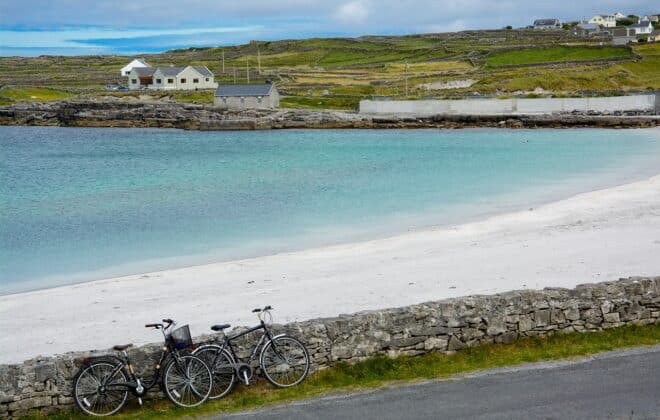Irish Language And Argentina’s Shared History 🇮🇪🇦🇷
Irish Language And Argentina 🇮🇪🇦🇷: Presumably, not a lot of our new readers know the history between Ireland and Argentina. In this blog, we mainly talk about the history of Irish immigration to Argentina. FluentIrish suggests that you stay on course and continue reading to learn more.
The revolution is not an apple that falls when it is ripe. You have to make it fall.
– Ernesto Guevara de la Serna, otherwise known as Che Guevara
A lot of people might know Che Guevara because of his iconic image. But unbeknownst to many, this Argentine revolutionary has Irish in his roots. Guevara was a descendant of Patrick Lynch, a Galway native. Born in 1715, he became an Irish emigrant and moved to Buenos Aires in 1749 through Bilbao due to land confiscations that happened in Ireland.
Along with Guevara, almost half a million residents of Argentina today have Irish descendants. Currently, Argentina has the largest Irish community in South America, the largest in a non-English speaking nation and the fifth-largest in the world.
How and when did this come about? Why did the Irish go to a non-English speaking country like Argentina wherein they had to pay for their passage to go there? Did the Irish diaspora in Argentina retain any connection to their Irish community?
All of these questions will be answered below, so as we always say – continue reading to learn more!
>>Check out the latest podcasts on FluentIrish.com – and start improving!
Irish language and Argentina: looking back in the past
In the 19th century, an estimated 40,000-45,000 Irish emigrants went to Argentina. However, the exact estimate is unknown due to poor record-keeping during the early periods of Irish immigration. In addition, official records at the time counted the Irish as English. Only in 1920 onwards did they separate the two, making track-keeping much more impossible.
20,000 only stayed in the country whilst the others went elsewhere, specifically to North America, with others going to Australia or other destinations. Of the 20,000, 10,000-15,000 did not leave descendants and/or even lost any connection they had to the local Irish community. This leaves the Irish-Argentine community at around 4,000-5,000 settlers.
Why did the Irish, mostly coming from Westmeath, go to other countries such as Argentina? The reason for that is because of the Great Potato Famine that occurred in 1845 that lasted up until 1852. Other names for this famine include Great Starvation, Great Hunger and Irish Potato Famine (as dubbed by non-citizens of Ireland/those not living in Ireland). The year 1847 was dubbed the ‘Black 47’, a time period in the famine considered by the Irish as the worst.
Where best to move
Looking to avoid dying of hunger and oppression by the Englishmen, the Irish sought to survive by making a tough decision: leave what they have in Ireland and emigrate to another country. There were three countries that were thought of as the best to move to, which were the United States, Canada and/or Argentina.
The Irish that emigrated from Ireland went to either Canada or the US, mainly because of two reasons: they would not need to pay to get there and a resounding majority of the natives speak the English language.
As for Argentina, they were a non-English speaking country and the Irish had to pay for their passage to get there. So, why would an Irish emigrating to another country choose Argentina that did not speak the English language, much less the Irish language, had a different culture and would cost money to go to?
The simple answer is because of religion. As a predominantly Catholic country, some Irish found Argentina the best country to emigrate to. They would, of course, not experience prejudices that their contemporaries would in North America led by anti-Catholic political movements.
Irish language and Argentina: Was it worth going there?
Our readers may initially think of the US, Canada or even the United Kingdom as a better option to go to instead of Argentina. However, there are a few, strong reasons why it was better to go to South America instead of its Northern half and why it was worth going to.
First, and as already mentioned above, was because of religion. Less prejudice (or even discrimination), a dominantly-Catholic country – quite enough to validate the worth of going to Argentina despite the lack of English and Irish language speakers.
What made it even more appealing to the Irish’s eyes are the Argentine Pampas. After all, escaping poverty in Ireland and moving to Argentina did not immediately mean prosperity. Initially, the Irish were meant to stay in Buenos Aires, but some ultimately decided to redirect their course straight to the Pampas. According to Sarah O’Brien’s book titled Linguistic Diasporas, Narrative and Performance: The Irish in Argentina, “so that they avoided the ‘moral contamination and temptations’ of Buenos Aires”.
The Pampas, aside from religious purposes, were sought out by the Irish because they were known for their luscious lands perfect for agriculture and remoteness. Argentina itself was a good country to go to because it had plenty of land available and was generally a wealthy Catholic place.
The Argentine middle class, or the bourgeoisie, as we would say, welcomed them because of their ambitions. At the time, they were pouring their efforts into cultivating an elite, white-coloured European community in South America, with the aim of joining the highest ranks of the emerging global economy at the time.
Learn Irish through FluentIrish
Now that we have shared with you the history of the Irish language and Argentina, we also want to discuss with you how we can help you in everything Irish-related.
ba mhaith linn plé leat freisin conas is féidir linn cabhrú leat i ngach rud a bhaineann leis an nGaeilge.
If you can understand simple Irish, you will want to improve. FluentIrish is here for you. Listen every day to get on with Irish.
Má tá tú ábalta Gaeilge shimplí a thuiscint – beidh tú ag iarraidh biseach a dhéanamh. Tá Fluentirish anseo faoi do choinne. Bí ag éisteacht gach aon lá chun a bheith ag gabháil ar aghaidh i nGaeilge.
We provide informative blogs and helpful podcasts that can help in your quest to learn the Irish language.
>>Which level?: Find out which level of spoken Irish you understand!




